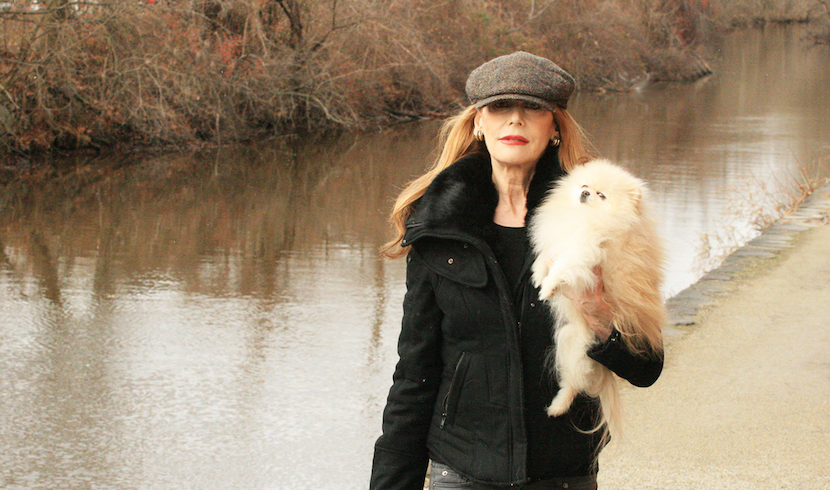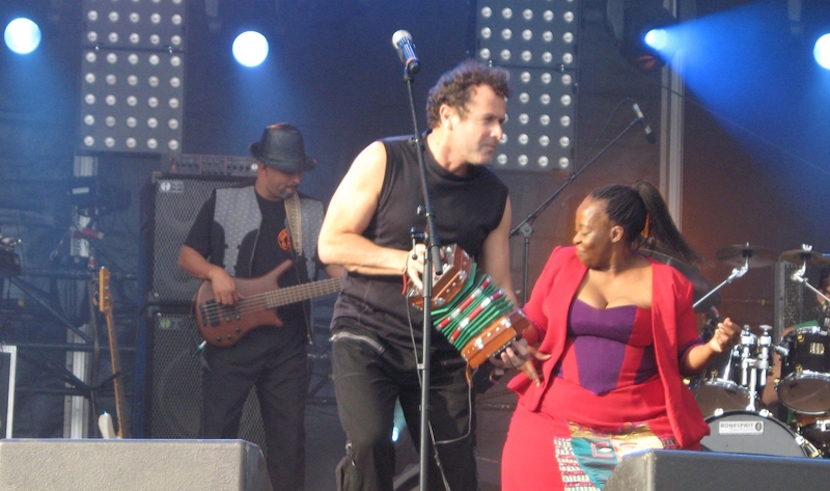As Parisians keep proving, style never goes out of fashion. Neither does the unique writing style of Jani Allan. Forced to leave South Africa after unwittingly getting caught up in the political turbulence of the 1980s, Ms Allan joined millions of her tribe who identify with being the “scatterlings” Johnny Clegg famously sang about. Now earning her living waitressing in New Jersey, Jani occasionally shares her life – and thoughts – with a grateful Biznews community. In this contribution she digs into realities faced by most who leave Mother Africa. As always with Jani Allan, it’s honest, from the gut writing. – Alec Hogg
By Jani Allan*
In the early eighties two young men came to the offices of the Sunday Times in downtown Johannesburg on a Monday morning to be interviewed.

One was a Lancashire-born son of a Jewish immigrant from Poland; the other was a Zulu migrant worker. During the interview (which took place in the office while someone hoovered the newsroom) they were slightly awkward and most obliging.
It was transparent as cellophane that neither Johnny Clegg nor Sipho Mchunu were used to the adulation that they were receiving.
They met when they were in their teens and formed Juluka. Juluka went on to become one of South Africa’s biggest musical exports. Their “Scatterlings of Africa” was first released in 1982 and remains the band’s biggest hit.
Although their albums were pointedly political, “Scatterlings” remains the track that all ex-pats sing along to when the knuckle-punch of homesickness floors them.
The word ‘scatterlings’ is ‘scattering’ with poetic license, I suppose.
Scattering, according to the dictionary, is less than desirable. It implies ‘to separate something tangible into parts at random and drive in different directions.’
Historically it is used in an even less attractive way.
“Scattering down the side streets, alley-ways, behind lumber piles, everywhere…anywhere” wrote Charles King about his foes being routed.
Of course not everyone who leaves South Africa is a scatterling. You can’t call Elon Musk (who until recently I thought was a deodorant) or Trevor Noah ‘scatterlings.’ Their privileged lives continue . They just have different Zip Codes.
Real scatterlings are those that have been strewn about indiscriminately and have fetched up by accident or happenstance or as a result of a poor decision made because of looming penury. In essence they are homeless.
‘I’m just staying with my mates in Ealing until I find my feet/get my papers sorted etc etc.
It’s a dot on the cards that there will be a fall-out with the mates in Ealing and then there will be a move to Wimbledon to another ma-plot situation.
When I left South Africa I became one such squatter. First I squatted with my friends in Ennismore Gardens, Knightsbridge.
Then I moved to Sloane Gardens where I rented a room from a young ginger bloke called Clint. As part of the rent I had to iron Clint’s shirts. My four-letter skills – work, cook and iron – were tragically light
(Of course nowadays I iron shirts for the servers at the resto since I am the de facto den mother.)
At first it is terribly exciting being a scatterling. We would go for drinks on some boat moored on the Embankment or in pubs we knew to be frequented by South Africans. We were a colony of ticks sticking to an old blanket. We would stand around talking about Clifton and Mrs. Ball’s Blatjang and how it costs R26 for a cup of coffee.
But soon it dawned on us. A festering grey maw of dawns:
To be a white South African in London in the nineties was to be as unlovely as roadkill.
When it came to South Africa everyone had an opinion.
One Easter weekend a few of us went to a pop-concert at Wembley Stadium.
Jesse Jackson was there and declared that ‘Nelson Mandela being here at Wembley is like the coming of Christ!’
Of course Mandela hadn’t been released yet. (One wasn’t sure whether Jackson knew this.)
A British band called Microdisney wasn’t ambivalent about how they felt about white South Africans. “We hate you white South African bastards,’ they bawled.
I was invited to take part in a BBC television debate on a show called Kilroy, which addresses controversial issues du jour.
The topic was whether Mike Gatting should have gone to South Africa to play cricket.
I came in for a lot of flak. A large Liverpudlian woman in a rah-rah skirt was apoplectic with rage.
“That woman! That woman! She’s an Afrikaner! She’s sitting pretty! Because she’s white!”
I hurried out after the show when a fist-fight broke out in the hospitality room.
**
At the other extreme there is another breed: the South African Groupie. Most of them haven’t been further south than the Isle of Wight but the topography of their einfuhlung is signposted with good intentions.
The SAGS gather at private parties in the House of Commons where they bang on about “cringing capitulation’ to the ‘mercenaries” who depend on funding by the ANC to live extravagant lifestyles.
Those were pre-internet days, pre-social media days, pre-Twitter/WhatsApp/Snapchat/Facebook and Instagram days.
The West is a great deal more informed about South Africa.
In America I am asked to explain the government’s intention to leave the International Criminal Court and a plethora of other poor decisions.
My Princeton gal pals spend evenings bemoaning the rape statistics in South Africa while quaffing Gosset Rose. They threaten to write fan letters to Thuli Madonsela.
Their husbands (patio furniture moguls and lawyers) compare Oregon Reds with Constantia cabs and demand to know how it is possible for Oscar Pistorius to be released.
They are bemused at the electoral success of a ruling political elite that is hallmarked with moral turpitude.
I tell them that treason, as someone once said, is a matter of dates.
- Jani Allan was South Africa’s first celebrity journalist – producing the best read full page in the Sunday Times during the 1980s. While there she wrote for the London Sunday Times. the Spectator, the Daily Mail, the Evening Standard and the Sunday Express, amongst others. She now lives in New Jersey in the United States where she is a waitress. She was recently in South Africa on a book promotion tour. Her book Jani Confidential, A Memoir is published by Jacana Media.


